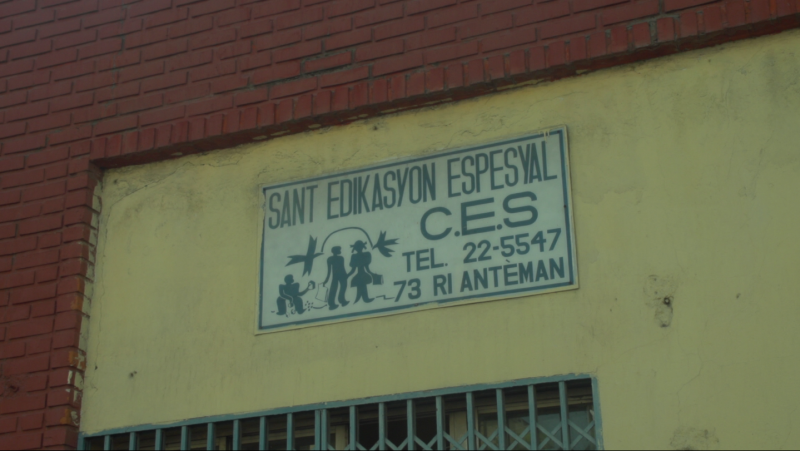
Centre d'Education Speciale (CES) sign. Image courtesy Lena Jackson, used with permission.
Of the children in Haiti who are born with disabilities, only one in 50 attends school, partly because the cost of this type of specialised education can be prohibitive. The Centre d'Education Speciale (CES) or Centre for Special Education in the island's capital Port-au-Prince is currently the only school in the country that offers free educational services to children with developmental disabilities.
As a low-cost institution for special education, CES is unique in Haiti, but it shouldn’t be — which is what prompted filmmaker Lena Jackson and her colleague Rowan Moore Gerety to create a film about the centre and its work. Global Voices interviewed them about their experience of working on the short.
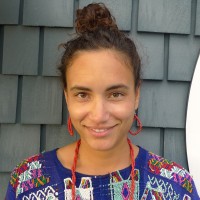
Filmmaker Lena Jackson. Photo used with permission.
Global Voices (GV): Can you tell me a bit about your professional backgrounds?
Lena Jackson (LJ): I'm an independent filmmaker and teacher. I've traveled to Haiti, India, Guatemala, Cuba and Zimbabwe working on videos for Fusion, Medium, PBS's EarthFix, Nomadic Wax, Sesame Workshop India, Cultural Survival, and Cuba Skate. I have a B.Sc. in Foreign Service from Georgetown University and an M.A. in documentary film from the University of California, Santa Cruz.
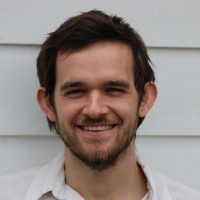
Rowan Moore Gerety. Photo used with permission.
Rowan Moore Gerety (RMG): I'm the Yakima reporter for Northwest Public Radio. Before that, I used to be a news reporter for KAZU, the NPR station in Monterey Bay, as well as a regular contributor to Marketplace. I've written for The Atlantic, Slate, Foreign Policy, Guernica, Courrier International, The Christian Science Monitor, and The Common, and produced radio stories for All Things Considered, Latino USA, Only a Game, Living on Earth, and The California Report. I was the launch editor for the African Makers series on Medium, a collection of writing about creativity in business and social welfare around Africa. I studied anthropology at Columbia University, was a 2011-2012 Fulbright Scholar in Mozambique, a 2013 International Reporting Project (IRP) fellow in Nigeria, and received a 2013 Jon Davidoff scholarship at the Wesleyan Writers Conference. I'm interested in inequality and economics in the developing world, as well as religion, housing, and global migration.
GV: How did you come to hear about Centre d’Education Speciale (CES) and decide to create this film?
LJ: I met the director of CES through a good friend who is Haitian-American. I visited CES in 2010 soon after the earthquake while it was housed in a temporary building. On another visit to Haiti, the director, Maryse Jean-Jacques, asked me to make a film to help spread the word about the programme and the challenges facing children with developmental disabilities in Haiti.
GV: CES is the only national institution in Port-au-Prince to help children with disabilities who come from poor backgrounds. Why is this the case if the need is so great?
RMG: There are a great many services — from access to safe drinking water and sanitation to healthcare and job training — that are unavailable for the large majority of people in Port-au-Prince.
Port-au-Prince is a difficult place to navigate and get things done, even (or especially!) for Haitians. Trying to educate children with special needs poses an additional challenge because, as is the case in most of the world, there is widespread stigma about developmental disabilities that sometimes extends even to teachers and parents.
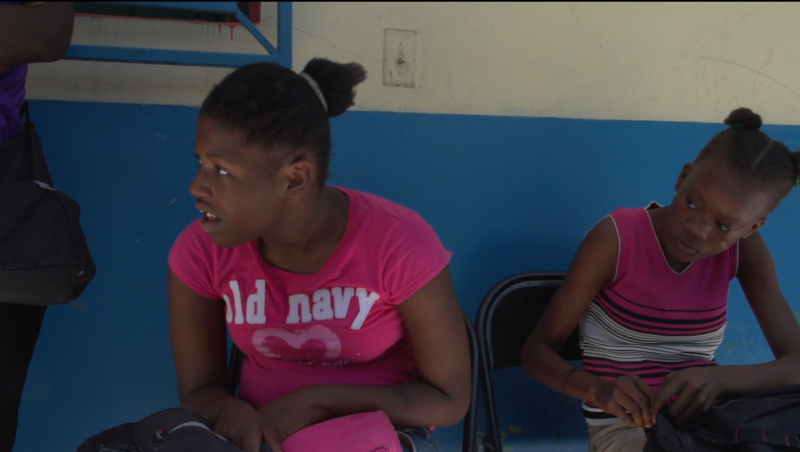
Girls in the hallway at CES. Photo courtesy the filmmaker. Used with permission.
GV: What is CES’ mission and how is the staff accomplishing it? Do they have offshoots in rural areas? Partnerships with other NGOs?
LJ: CES’ long-term goal is inclusion of children with developmental disabilities in the mainstream school system. To this end, they have trained teachers and staff at a number of schools in other parts of the city and beyond to work with former CES students wherever possible. After losing their building and some funding in the 2010 earthquake, however, they have had to curtail some of this work to focus on rebuilding their core programs: the school and diagnostic clinic in Port-au-Prince. That said, when we visited, it was obvious that people from around the country relied on their services: we met visiting mothers from as far away as Jérémie, an eight-hour bus ride from PAP. CES also works with a troupe of clowns, Les Reskapés (featured in the film), trained by Clowns without Borders, to promote self-esteem and confidence in social situations among their students.
GV: How does CES define an “intellectual disability” and what process do families have to go through in order for children to be enrolled? Do they have to pay anything or is the service free?
RMG: We don’t know the exact criteria CES considers in determining whether children have a developmental disability. The way it was explained to us is that spots in the CES school are reserved for children with the most acute needs. Families begin by visiting the clinic attached to the school, where a doctor, physical therapist, and speech pathologist conduct intake visits. Many families whose children are not enrolled in the school still visit the clinic regularly for diagnostics and physical therapy. The school is free; there are nominal fees for some of the medical services to offset the costs of hiring an outside doctor.
GV: Explain how such disabilities can reinforce the cycle of poverty these families face.
RMG: Only 1 in 50 Haitian children with disabilities attend [sic] school. This is a tremendous setback both for the children who stay home, and for parents who might otherwise be out working. Being excluded from school both reinforces the common perception that children with disabilities are a burden, and deprives them of the opportunity to develop useful skills that could help them earn a livelihood. Several former students at CES now work in maintenance/cleaning there, and told us of the difficulty of finding jobs elsewhere.
GV: Do people know about CES? Is there a level of awareness about these types of conditions in Haiti? It also seems that women and children are the most vulnerable — is there anything being done on a national level to change this?
LJ: It was clear during our visits that CES has a reputation well beyond the surrounding neighbourhood. One mother described moving to a different neighbourhood in Port-au-Prince specifically to be closer to the school. Even so, getting children with developmental disabilities through the door at CES is the hardest step. For many parents, it seems that having a specific diagnosis, together with exercises or dos and do-nots, goes a long way towards combatting the stigma they may feel. On the national front, we’ve been told of government programmes to support people with disabilities (physical and developmental) in the workplace. But like so much of what the Haitian government undertakes, the needs are great and the resources –and capacity–limited.
GV: The CES is a bright spark in the midst of a bleak economic landscape. What are some of its greatest challenges or limitations?
RMG: Sustainable funding seems to be their most urgent concern. It has been a struggle for the organisation to pay staff salaries consistently, or keep up any of their former outreach programmes and partnerships outside Port-au-Prince. Social attitudes towards developmental disabilities, as it is here in the US, take a long time to shift. Clearly this poses a challenge for the work CES does, but bringing about that change is also a core part of their mission.
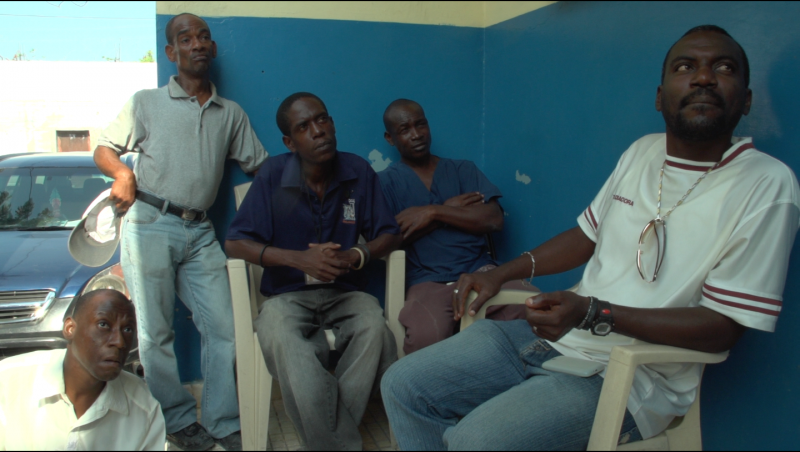
Some of the men at CES. Photo courtesy the filmmaker. Used with permission.
GV: What was the most impressive or touching thing you witnessed while making this film? What do you hope the film will accomplish for CES?
LJ: Seeing the theatre troupe/clowns (Les Reskapés) work with CES students was mesmerising. We were deeply touched by the students’ transformation during the roleplaying and theatre exercises they did together. Almost immediately, they became brash and outgoing, excited and funny. It was inspiring to see the close bonds between the Reskapés and the students. We want to bring attention to the great work CES does on a daily basis, and help them raise money to support it.
If you’re interested in learning more or supporting CES, you can contact the director of CES, Maryse Jean-Jacques, at marysejj88@yahoo.fr or the filmmaker, Lena Jackson, at lenaisabeljackson@gmail.com. You can also visit CES’ website.







1 comment